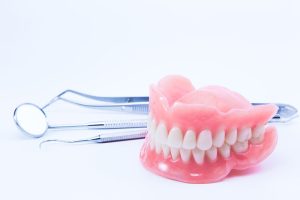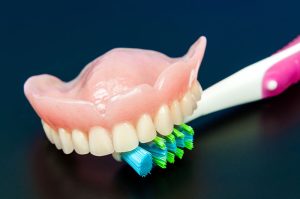A denture is a removable replacement for missing teeth and surrounding tissues. It is made of acrylic resin or a combination of acrylic resin and various metals.
Types of Dentures

Complete Dentures v Partial Dentures
Complete dentures replace all of the teeth on the top or bottom arch of the mouth. Partial dentures are used when one or more teeth are missing, but we still have healthy teeth remaining to anchor onto. This article discusses complete dentures. For more information on partial dentures, click here.

Complete Dentures
Complete dentures are used when all of the teeth are missing or the condition of those remaining are poor. Complete dentures can greatly improve the chewing and speaking ability of patients as described above, and can even make a patient look much younger. The body of the denture is custom made to intimately fit the gums and soft tissues, and can provide support for the lips and face to help patients achieve a more youthful appearance. The teeth on a denture will replace the form of natural teeth, which is a great upgrade when a denture I needed. Sometimes implants are needed to increase stability and produce stronger chewing forces.
Immediate Dentures vs Final Dentures
Immediate Dentures are custom made for a patient BEFORE the last of their teeth are extracted. These dentures are to replace teeth the same day as the teeth are extracted. A patient will come to the office with teeth that are broken down or failing, and leave that same day with a full set of beautiful white teeth. These are temporary dentures because the dental laboratory technician has to estimate the level of bone at the end of surgery, which limits their initial hold. Also, in the 4 to 6 months following surgery, the bone around the teeth that have been extracted will change shape until they settle on a stable position, this is called remodeling. This means during the first few months following surgery, Immediate dentures may get looser over time, which might require a rebase or a reline. Once the bone has finished remodeling, the patient is ready for their Final denture.
Final dentures are intimately produced for a more comfortable, long-term fit. The dental laboratory technician is no longer “guessing” where the bone is going to end up. Final dentures are appropriate for patients who have completed their post-surgery healing or patients who are already wearing a denture and need a new denture. The final denture requires a series of appointments during which we carefully measure the size and position of the jaws in order to create a denture with high-quality speech, stronger hold and superior aesthetics.
Overdentures
In situations where an individual has lost a significant amount of bone, or stronger chewing forces are desired, implants can be used to fix or hold a denture in place. There are many ways to attach a denture to an implant. The most common method is to use “button” attachments on the implants and the denture in order to snap the denture into place. A custom evaluation is needed to evaluate which implant-related option is best for each individual.

How are Dentures Made?
The denture process takes about one month and five appointments for a high-quality end result. Throughout the process the dentist will discuss expectations to design a denture that works best for the patient.
Appointment #1:
The dentist will evaluate the hard and soft tissues of the mouth. The dentist will also take an impression of the upper and/or lower arch.
The dentist will use these impressions to make a model of the patient’s arch and to make a customized tray for the second (high accuracy) impression.
Appointment #2:
The dentist will use the custom-made tray to take a high accuracy impression of the patient’s arch to ensure the Final denture is an intimate fit.

Appointment #3:
A mock-up of the final denture with a wax rim will be used to measure the exact positioning of the teeth. The positioning of the teeth play a big role in how a denture looks, feels, and sounds.
Appointment #4:
This appointment we get to see all of the teeth in their final position. This is our last chance to make changes to how the denture looks or sounds.
Appointment #5:
We made it! We deliver the final denture in all its splendor. We make adjustments where necessary.
Follow-up Appointments:
At Madison Dental Health Partners we stand behind everything we make. We will monitor the comfort and function of the denture over the next several weeks to ensure it’s working well. Adjustments are sometimes necessary to attain optimal comfort and function. We encourage patients to visit often and let us know how they’re doing.
Care of Your Denture

- A new denture can be life-changing, but it can also be a tasty treat for a curious pet.
- Carefully remove your dentures over a sink or over a folded towel. We have heard of very creative ways patients have lost their dentures (…flush!)
- Brush your denture with a soft toothbrush and a gentle dish soap, such as Dove or Dawn. Be sure to brush daily to minimize staining over the long-term.
- Do NOT use toothpaste to clean your dentures. Toothpaste is abrasive and will scratch polished the surface and invite staining.
- At night, remove your dentures and leave them soaking in a denture solution or water.
- If dentures are left out dry they can change shape causing the denture to lose some of the intimate, custom fit.
- If dentures are left in the mouth overnight they can become a breeding ground for bacteria and fungus which cause disease.
- For optimal health (and breath) continue to brush your gums and tongue every morning before you put in your denture. This will stimulate circulation to the gums and keep your denture feeling (and smelling) fresh.
Common Concerns
Eating will take a little practice. Start with soft foods cut into small pieces. Chew slowly using both sides of your mouth at the same time to prevent the dentures from tipping. As you become accustomed to chewing, add other foods until you return to your normal diet.
Continue to chew food using both sides of the mouth at the same time. Be cautious with hot or hard foods and sharp-edged bones or shells.
Pronouncing certain words may require practice. Reading out loud and repeating troublesome words will help. If your dentures “click” while you`re talking, speak more slowly. You may find that your dentures occasionally slip when you laugh, cough or smile. Reposition the dentures by gently biting down and swallowing. If a speaking problem persists, let us know.
Denture Adhesives
Denture adhesives are a multi-billion dollar industry. This is because dentures, even when made well, are limited in function when compared to natural teeth. Dental adhesives are NOT a solution to old or ill-fitting dentures. Ill-fitting dentures can contribute to the development of sores, ulcers, and bacterial and fungal infections. Ill-fitting dentures may need to be relined or replaced. If a denture does fit intimately but there isn’t enough bone to keep it stable, implants can be a wonderful solution. Implants require a custom treatment plan designed to help you meet your expectations. Visit us for a free implant consult any time.
